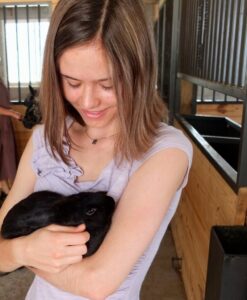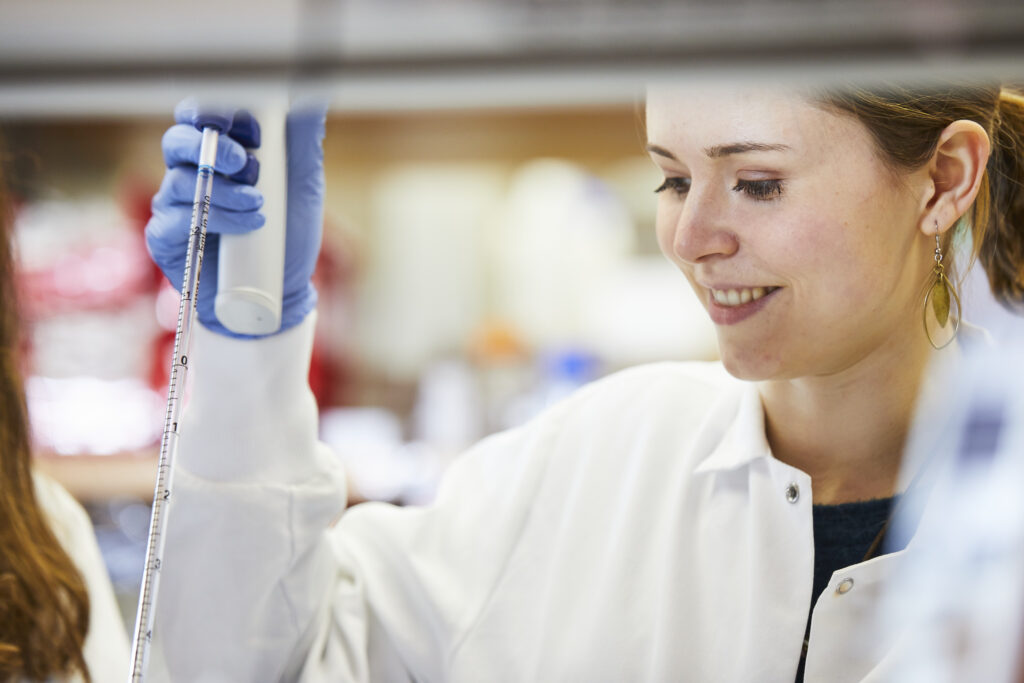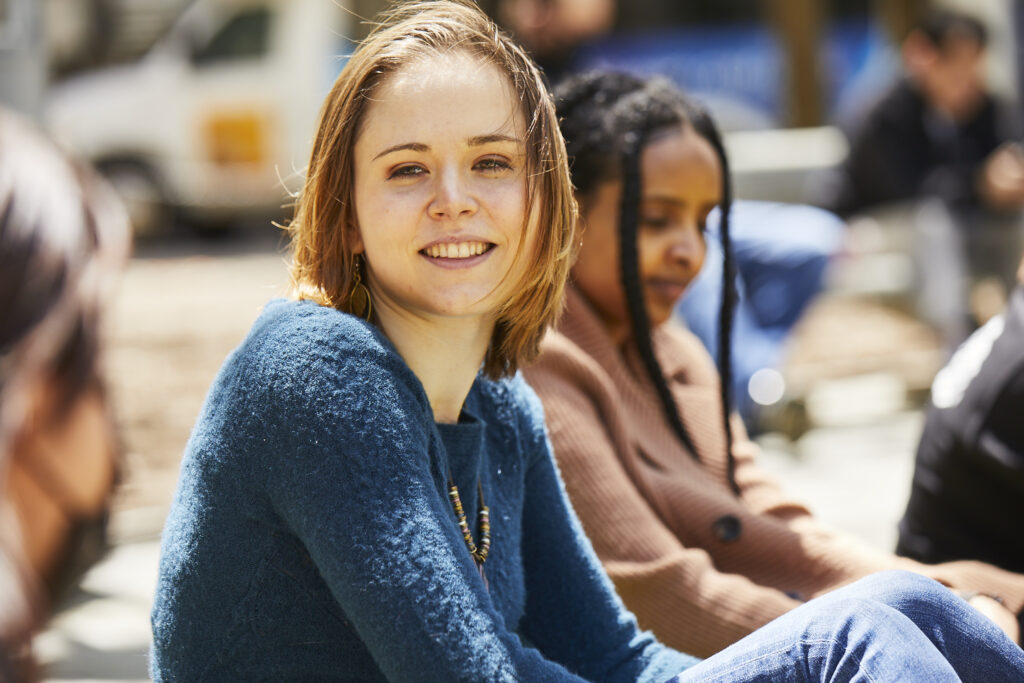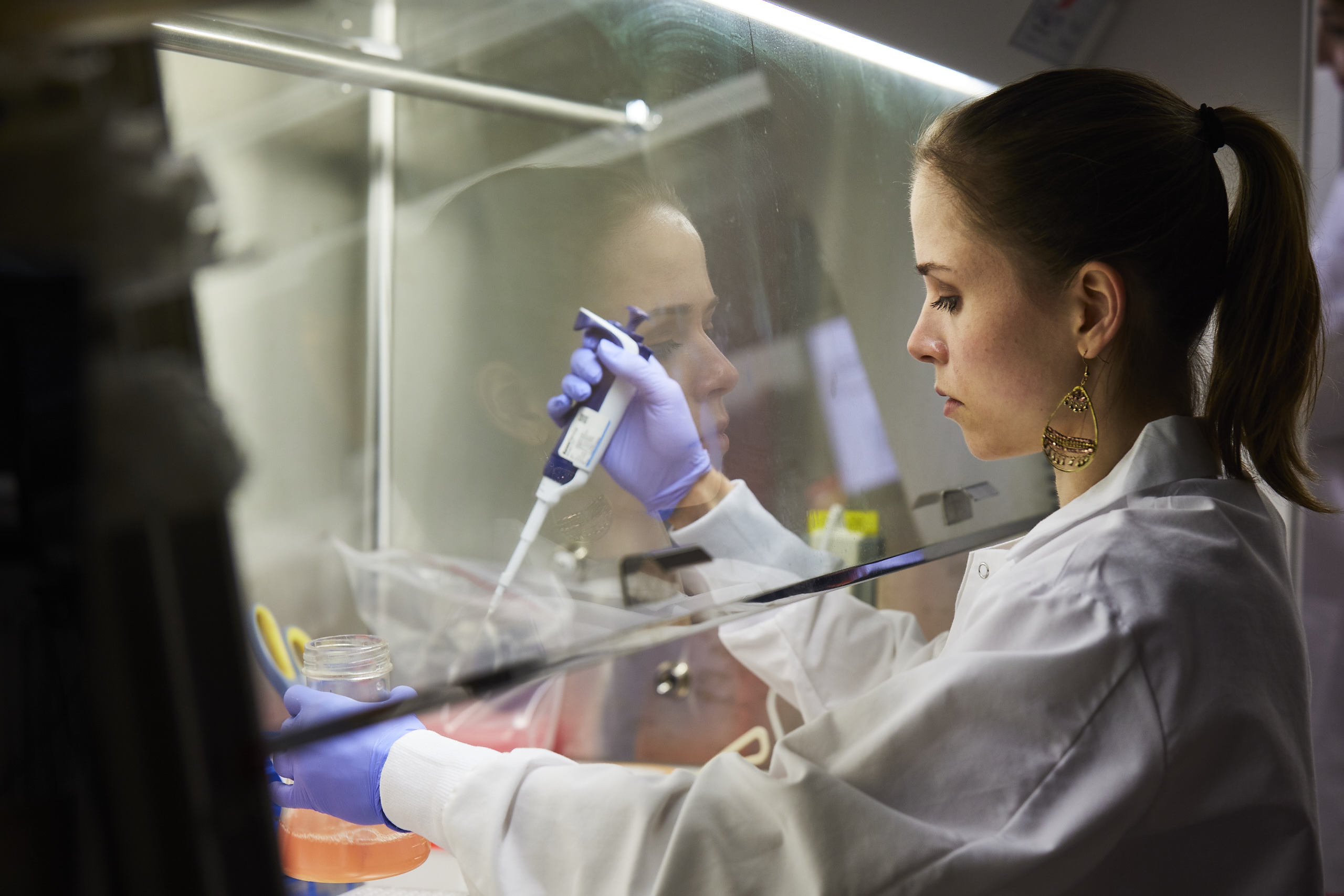Eliza Gavin was always the kid who wondered why. As a middle schooler, she’d look at a piece of crystallized rock candy, hypothesize how it formed and then learn how to make a supersaturated solution on the stovetop.
In high school, she learned about DNA replication, how enzymes unzip paired strands and catalyze cell growth and reproduction. She’d watch through a light microscope as amoebas consumed bacterium in front of her eyes. And she found her early inquisitiveness quickly directed toward biology.
“This whole universe was right underneath my nose,” she says. “I was just so amazed by all of the things that are going on in a cell — and you can’t even see it.”
Now, as a research associate at the Institute for Protein Innovation (IPI), she’s focused on structures that she cannot see: antibodies stabilized through strategic disulfide bonding. Quirky receptors that play a key role in the wiring of the brain and central nervous system. The path of her future toward medical school.
“IPI has really helped me deepen my research knowledge,” she says, “and the people have all been extremely supportive, in both my research endeavors and career development.”
Growing up
As the only child to a single mother, Gavin was also well attuned to the ways her helping hands could ease her mother’s stress. From the age of five or six, she’d find small means of lending support, whether setting up movie nights or doing laundry. She’d serve dinner dressed up as a waitress, complete with menus in hand, albeit with just one item listed — the thing she’d already cooked.
“It would make my mom smile and feel better,” she recalls.
That was the initial point when she realized, in addition to doing science, “I really want to heal,” she says. “I really want to help people.”
She caught her first glance at her dream job as a rising freshman at Georgetown University. She heard about the Clinic for Special Children, a clinic tucked at the end of a single-lane road cut between dairy farms and cornfields. The Clinic treated children with rare genetic conditions, focusing on treatment of the Amish and Mennonite communities local to southeastern Pennsylvania.
“I told them, ‘Please teach me. I will do whatever you need,’” Gavin says.

She spent her summer stationed amid the fields, in a post-and-beam style office raised by local volunteers, writing blogs about treatments and observing the research around her.
Downstairs, the Clinic hosted high-tech genetic tools. Upstairs, doctors treated patients from the surrounding Plain communities. The whole enterprise, Gavin says, was steeped in a striking blend of research, clinical care and community building.
“Being immersed in that and being able to help out in that environment — I really wanted to do that with my future career,” she says.
Since then, for nearly 10 years, Gavin has triangulated her every move based on the Clinic’s three-pronged approach to medical care.
As an undergraduate researcher, she joined the Schlegel Lab and the Silva Casey Lab at Georgetown. There, she repurposed FDA-approved drugs, such as the antimalarial artesunate, to improve cervical cancer treatments and looked at the role of transcription factors on neural development. In the Umemori Lab at Boston Children’s Hospital and Harvard Medical School, she studied the effects of biomolecules in the brain.
After graduation, she got her first taste of family medicine working at Atrius Health in downtown Boston. As a medical assistant, she helped treat patients of all ages, taking patient histories and performing in-office procedures, including electrocardiograms and reproductive health procedures.
Gavin’s mentor, Meredith Amos, would sit down with her every morning to review patient labs and notes. They’d work together to develop treatment plans, which Amos would then bring back to the patients.
“I felt like I was actually having an impact,” she says. “In addition to all of that learning, I was also really connecting with my patients.”
Providing answers
Then Covid-19 hit.
Patients were coming in with sore throats, respiratory issues, gastrointestinal symptoms and other mysterious ailments. The clinic moved online, offering telemedical appointments to limit transmission. In those early stages, Gavin — and the medical community at large — knew next to nothing about this rapidly spreading, novel coronavirus.
“We were frustrated that we couldn’t do more, and we didn’t have more answers for the patients,” she says.
Asking why, Gavin came to IPI.

She knew from her clinical work and previous research that antibodies, like those in development at IPI, were extremely powerful therapeutic tools: highly specific, broadly applicable and used in all forms of research. IPI’s new type of yeast-borne antibodies were poised to go beyond the limitations of traditional, animal-based antibodies and make life-altering discoveries.
For Gavin, joining IPI was an opportunity to provide answers — at a time when answers were in short supply.
“I wanted to do something impactful in the middle of this pandemic,” she says.
As a research associate on the Protein Production team, she jumped headfirst into an antibody stabilization project. She designed and produced the constructs before testing them for thermal and chemical stability and antibody denaturation.
She then began working with roundabout receptors (ROBO), a family of transmembrane receptors that play a key role in the wiring of the brain and central nervous system. Previous IPI research had uncovered ROBO antibodies that were highly specific — “which is great,” Gavin says, “but we didn’t have enough affinity.”
To rectify that, she learned under the tutelage of protein production scientist Roushu Zhang how to develop bispecific antibodies. These composite antibodies are assembled from the severed heavy chains of two moderate binding antibodies — essentially borrowing “half of one and half of another,” Gavin says.
While the ROBO bispecifics are still in their testing phase, the process promises to aid in the rescue of other candidates with subpar affinity, increasing the odds of viable antibodies.

In between designing and testing antibodies, Gavin has been busy. For years she’s had medical school in her crosshairs, studying for the MCAT, writing applications and prepping for in-depth interviews.
Finally, after a last push at IPI, that work has paid off. In August 2022, Gavin will head off to Philadelphia with a full-tuition scholarship to attend the University of Pennsylvania’s Perelman School of Medicine — less than 100 miles from the Clinic that inspired her journey.
“I want to get back to at least the concepts of when I was at the Clinic for Special Children. I love the research, I love the clinic and I know I like connecting with communities,” she says. “If I can get back there, then I know I’ll be in the perfect place for me in my career.”
Writer: Caitlin Faulds, [email protected]
Source: Eliza Gavin, [email protected]


